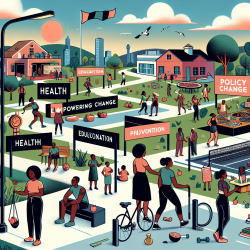Empowering Change: Advancing Health Equity in Black Communities
In the face of persistent health inequities and structural racism, the field of prevention science offers a beacon of hope. The special issue, "Advancing Health Equity Among Black Communities," provides a comprehensive exploration of how prevention science can serve as a catalyst for change. By understanding and addressing the systemic barriers that perpetuate health disparities, practitioners can enhance their skills and contribute to a more equitable society.
Understanding Structural Racism
Structural racism is a pervasive system where embedded values, practices, and policies facilitate differential treatment based on race. It operates subtly within institutions, often unnoticed, yet significantly impacts health outcomes for Black Americans. The research presented in this special issue highlights the urgent need to address these systemic barriers to achieve health equity.
Key Insights for Practitioners
Practitioners can draw valuable insights from the research presented in this special issue. Here are some key takeaways:
- Shift Focus to Structural Interventions: Murry and colleagues emphasize the importance of moving beyond individual interventions to address structural barriers. This shift requires a retooling of methods and measures to evaluate contextual impacts on interventions and equity outcomes.
- Leverage Protective Factors: Studies by Summers-Gabr and others explore protective factors unique to Black communities, such as emotional regulation and racial socialization. Practitioners can harness these factors to mitigate the effects of discrimination and promote resilience.
- Engage in Policy Change: Roman's conceptual model demonstrates how prevention science can inform policy changes to reduce inequities in access to care. Practitioners can advocate for policies that address structural racism and promote equitable health outcomes.
Encouraging Further Research
The special issue underscores the importance of continued research to uncover pathways for reducing health disparities. Practitioners are encouraged to engage in research that explores:
- Ecological and Systems-Level Interventions: Expanding research beyond individual-level interventions to include ecological communities and systems can provide a deeper understanding of the societal and systemic nature of discrimination.
- Policy Solutions: Developing policy solutions that address both intentional and unintentional harms to minoritized communities is crucial. Practitioners can contribute by advocating for policies that promote health equity.
Call to Action
The research presented in this special issue serves as a call to action for practitioners to extend their efforts in addressing structural and individual racism. By focusing on the prosocial strengths of Black youth and engaging in critical service learning, practitioners can raise awareness and promote action against racist practices.
To read the original research paper, please follow this link: Introduction to Special Issue on Advancing Health Equity Among Black Communities.










